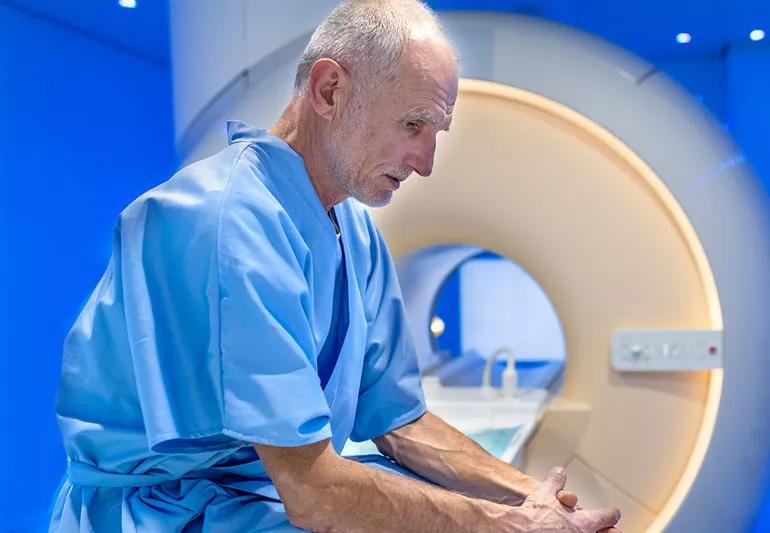What to know about cardiac implants and imaging tests

Image content: This image is available to view online.
View image online (https://assets.clevelandclinic.org/transform/13cbe72e-ebf3-4c7c-b3fd-1dab92943aa2/elderMRI-1309543883-770x553-1_jpg)
elderly man before MRI scan
If you have an implanted device such as a pacemaker, heart valve, stent or implantable cardioverter defibrillator (ICD), you’re probably aware that it can set off the metal detector at the airport. Your device, which contains metal, interacts with any detector that responds to metal.
Advertisement
Cleveland Clinic is a non-profit academic medical center. Advertising on our site helps support our mission. We do not endorse non-Cleveland Clinic products or services. Policy
So if your doctor says you need an MRI or CT scan, will that create problems for you or your device?
The answer to this question is not a simple yes or no — it depends on the type of device you have.
Here, diagnostic radiologist Scott Flamm, MD, reviews what you need to know about getting medical scans when you have an implanted cardiac device.
“A CT (computed tomography) scan generates a cross-sectional view of your body through a series of X-ray images. If you have any device implanted in your chest or body, it’s safe for you to have a CT scan. There are no limitations,” says Dr. Flamm.
Although the scan will not affect your device, if it’s on the larger side, your device can sometimes affect image quality.
“Some of these devices — particularly larger ones, like left ventricular assist devices and some defibrillators and pacemakers — can create dense streaks that partially obscure the images we acquire with the CT scan,” Dr. Flamm says. “But that would not prevent us from doing a CT scan.”
MRI (magnetic resonance imaging) uses a large, circular magnet and radio waves to produce clear computer images of the body.
“Most heart valves and coronary artery stents currently on the market and implanted in patients can go safely through an MRI scanner,” Dr. Flamm says.
Advertisement
“However, for decades we’ve considered it unsafe for patients with pacemakers and defibrillators to go into an MRI scanner,” he notes. “It’s been an absolute contraindication.”
More recently, however, manufacturers have developed some pacemakers and defibrillators that can be scanned with an MRI.
“We don’t refer to them as ‘MRI-safe’ but instead as ‘MRI-conditional’ — we can perform MRI scans on patients with these devices, though there are some limitations,” says Dr. Flamm.
He continues, “For instance, we’re careful about how much MRI ‘energy’ we use. We may therefore limit the time we spend scanning a patient and limit the kinds of images we acquire. As a result, we might acquire some images from a patient who does not have an MRI-conditional device that we won’t on a patient who has one.”
If you have an older pacemaker that is not MRI-conditional, Dr. Flamm would not routinely recommend an MRI scan. However, more data has become available illustrating that even patients with MRI-conditional devices may have MRI scans under carefully supervised conditions.
During MRI, electricity applied to the magnet creates an alternating magnetic field. If you placed a wire within that alternating magnetic field, it could generate current and heat up.
For pacemakers and defibrillators, metal “leads” that are similar to wires are implanted in the body and the heart muscle. Leads that come within the MRI scanner’s alternating magnetic field can generate electricity, or heat up, while touching your heart.
“We worry about the heart muscle being heated or even potentially burned, which could turn into scar tissue,” Dr. Flamm says. “Also, since we’re developing a current within the lead, we’re concerned about stimulating the heart such that it starts to beat abnormally and creates an arrhythmia within the heart.”
Despite these concerns, Dr. Flamm shares that as radiologists and cardiologists have learned more about these older devices they understand that in some of these patients MRI scans can be performed safely. Not every patient can be scanned, though many now can as long as, “all of the proper safety mechanisms are in place,” he says.
When you get an implanted device such as a pacemaker or defibrillator, you receive a card identifying that device. It includes the manufacturer, model name and model number, a website and a phone number to call with questions. Keep track of that card.
“It’s important and helpful to have this available because that gives us all the important information we need on whether, and how we can perform an MRI scan safely,” Dr. Flamm says.
Advertisement
If you’re not sure which device you have and don’t have a card with this information, the steps it takes to find out more about your device can delay your MRI scan indefinitely.
“If we’re in the dark on what device you have, then for safety’s sake, we won’t perform a scan,” Dr. Flamm says. “We need to know precisely what we’re dealing with to make sure we don’t harm patients.”
Advertisement

Sign up for our Health Essentials emails for expert guidance on nutrition, fitness, sleep, skin care and more.
Learn more about our editorial process.
Advertisement
Complications related to the implanted device leads may go unnoticed
Glitches are possible but unlikely
Most recommended precautions center around minimizing bruising or swelling
Even one drink can have an impact on your cognitive function leading to slurred speech, blurred vision and impaired memory
Understand who may (and may not) benefit
Lorem ipsum dolor sit amet. Et odio Quis vel ipsam omnis eum alias deleniti et placeat impedit non voluptas galisum hic autem enim et cupiditate aliquid. Est beatae quidem non facilis autem ut commodi nisi aut tempore rerum et dolores voluptatem cum enim optio id sapiente quasi. Ad laboriosam officiis 33 cupiditate sequi ea voluptatum consectetur qui necessitatibus voluptate et quasi doloremque et facere explicabo quo explicabo officia
Type 2 diabetes isn’t inevitable with these dietary changes
Applying a hot or cold compress can help with pain
Pump up your iron intake with foods like tuna, tofu and turkey